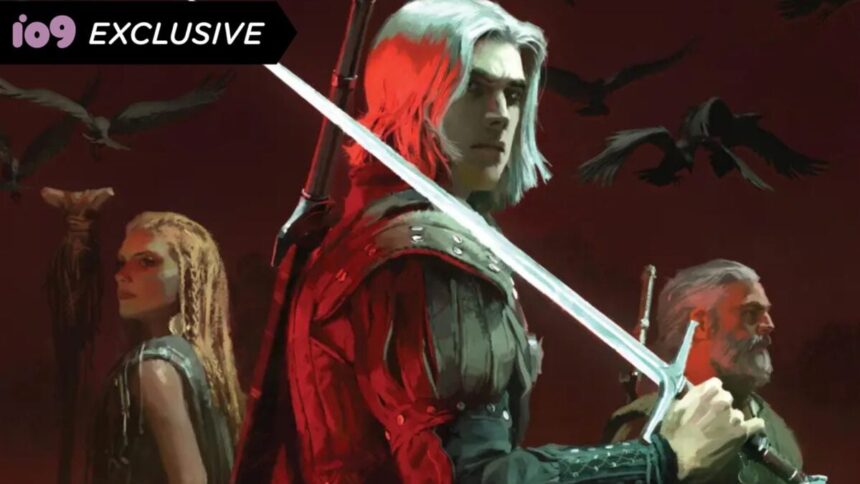Fans of The Witcher may be waiting awhile for the show to return to Netflix, but something just as exciting is coming very soon: Andrzej Sapkowski‘s first new Witcher book in over a decade, Crossroads of Ravens. It’s getting a global release September 30, translated into various languages (the English version is from series veteran David French), and io9 has an exclusive excerpt to share today.
Here’s a summary of what you can expect from this standalone work:
“Before he was the White Wolf or the Butcher of Blaviken, Geralt of Rivia was simply a fresh graduate of Kaer Morhen, stepping into a world that neither understands nor welcomes his kind.
And when an act of naïve heroism goes gravely wrong, Geralt is only saved from the noose by Preston Holt, a grizzled witcher with a buried past and an agenda of his own.
Under Holt’s guiding hand, Geralt begins to learn what it truly means to walk the Path—to protect a world that fears him, and to survive in it on his own terms. But as the line between right and wrong begins to blur, Geralt must decide to become the monster everyone expects, or something else entirely.
This is the story of how legends are made—and what they cost.”
Read on for an exclusive excerpt from Crossroads of Ravens, where a young Geralt has recently been rescued from the noose by a mysterious Witcher named Preston Holt…
The Kingdom of Kaedwen was known throughout the inhabited world for its cold and capricious weather. Enclosed from the north by the barrier of the Dragon Mountains, and from the east by the great massif of the Blue Mountains, the land suffered from erratic and frequent visitations of air masses causing long and bitter winters, cold springs and short, rainy summers. As regards autumn, it varied—once sunny, warm and pleasant—once nothing of the kind.
Now, in the month of March, called “Birke” by the elves, the snow still remained here and there in ravines and hollows, while white patches lay in depressions in glades. Ice still covered some puddles and dykes in yellowing sheets. Although the sun gave off some warmth, when frosty winds blew from the mountains, they stung no less than in January.
Geralt had set off from Kaer Morhen the day before the Equinox. That was the custom of witchers. It was thus practised because after the winter monsters were at their hungriest, and so vicious that folk in villages and settlements were inclined to indulge in the hiring of a witcher, even though during the hungry gap they had eaten their stores and were practically destitute. But Geralt never got the chance to be hired. For things went as they went; barely two days’ ride from the mountains and bang! the peasant and his daughter, the marauders, the bald enforcer with the rotten teeth, wham, bam, and here we are. He had found himself being judged by Alderman Bulava of Neuhold, and then being rescued from that and the threat of being lynched by soldiers from the nearby fort by the strange white-haired individual with two swords on his back, riding a black horse, whom Geralt was now following.
“I suggest,” said the strange individual, turning around in the saddle, “that we ride together for a time. Captain Carleton may still want to hang you; it was apparent he wants it very much. He isn’t stupid enough to come after me, but you, alone, could be an easy target. So, if my company doesn’t bother you—”
“Not a bit,” said Geralt hurriedly, urging on his dun mare. “Gladly . . . I . . . I am—”
“I know who you are. Did your hair turn white after the mutations? After the Transformations? Loss of pigment, like I had?”
“Aye . . . But how—”
“How did I know there was someone like you there? Because I follow what goes on up there in the Stronghold. And it reached my ears that some wunderkind called Geralt had finished his training and was soon to venture abroad.”
“But Vesemir—”
“Never mentioned me? He never let slip the name ‘Preston Holt’? I’ll explain: Vesemir and I have been moving in different orbits, so to speak, for some time. If you know what I mean.”
Geralt didn’t actually know what an orbit was, but nodded wisely.
They rode on for a while in silence. Side by side.
“So, you set off from Kaer Morhen,” Preston Holt said finally. “You perhaps didn’t have the best beginning, but that’s the way it is with beginnings. In any case, I don’t mean to chide you. Quite the opposite; I had a look at that marauder’s body and your cuts may be considered faultless. Unnecessary, perhaps; ill-considered, perhaps; inelegant, perhaps—but actually faultless.”
They fell silent again, watched a herd of cattle being driven onto a mountain pasture and the cowherd running from cow to cow in order to warm his frozen little feet in fresh, warm cowpats. The cowpats didn’t warm him up much, but the running did.
“They’re driving cows, though the grass is barely peeping out of the ground,” observed Holt. “It’s a sign the season’s begun and you’ll have no difficulty finding work, Geralt. The villages will soon be willing to pay for their herdsmen and livestock to be protected. Let’s ride over there into the birchwood, near the opening of the sough.”
“The opening of the what?”
“The sough. That open channel there leads to a sough, a tunnel once used to drain water from a mine. We are—as you no doubt know—in the part of the Kingdom of Kaedwen called the Upper March. The wealth of the Upper March is mines: mainly salt, but also silver, nickel, zinc, lead, lapis lazuli and others. At least that’s how things were; today most mines are close to being worked out. Nothing lasts for ever.”
Geralt didn’t comment.
“Do you see that hill up ahead? It’s called Podkurek, that’s how it appears on official maps. And it came about because around a hundred years ago a peasant named Podkurek quite by chance dug up there a nugget of silver the size of a large cabbage. A mine was established here right away, extending into the mountainside. Large amounts of silver and galena, which is lead ore, were mined. But the deeper the miners dug, the more problems they had with water. There are more soughs like this one, you’ll see them. Finally, the costs of drainage made the entire extraction unprofitable. The miners moved to other places. They left a labyrinth of corridors and goafs, now partly flooded. And now the best part: the abandoned and flooded mine has been occupied and taken over by roving cynocephaly. I imagine you know what they are, don’t you?”
“Cynocephaly,” recited Geralt, after taking a deep breath, “are small creatures resembling dog-headed monkeys. They are gregarious and live underground in the dark. They’re dangerous in packs—”
“Infernally dangerous,” interrupted Preston Holt. “And quite often torment the amateur miners that come here to dig in the slopes of Podkurek in search of silver, which you can still find here. Look, there’s the proof of my lecture: those light patches over there are the canvas sheets of wagons and tents. We’re heading right for a camp of intrepid diggers. The first this spring.”
The intrepid diggers greeted them initially with a delegation armed with shovels and stout cudgels. The menacing expressions of the welcome party sent a simple message: get out of here, strangers, we was ’ere first. Their expressions soon softened, however, when they saw that the newcomers weren’t unwanted competitors. Indeed, joy appeared on their previously unfriendly faces.
“Goodness me, thank the gods!” cried the chief digger, hiding behind his back a mattock, which only a moment earlier he had been twirling warningly. “Thanks be to the gods! Goodness me, why it’s the Most Honourable Witcher! And because we heard you were in the neighbourhood, we were meaning to send word to you. But instead, you arrive out of nowhere, out of nowhere!”
“That is my custom,” said Preston Holt, straightening up in the saddle. “To appear from nowhere to help those in need. For I am a witcher.”
In the meantime, several lamenting women had joined the diggers. The clamour became louder and louder and more and more incoherent. Preston Holt began to call for order using his voice and gestures. It was some time before it became possible to discern what it was all about and what the diggers and the women were trying to express.
“We’re in need of a witcher!” called the chief digger, brandishing his mattock. “Those underground creatures what live under the mountain carried off a boy! They attacked, seized him and dragged him into the abyss! Who will rescue him now, if not you?”
“It’s not two weeks ago,” said Holt, “that I warned you to stay well away from the shaft and the gallery. Well? Didn’t I tell you? To dig on the other side of the mountain? The cynocephaly have seized a boy, you say? How old? Five? When was it? Ah, the day before yesterday? Why, you didn’t hurry to send word to me. Dismount, Geralt.”
Preston Holt got off his horse. Geralt couldn’t help noticing it caused him difficulty. And that his left leg was very lame. With a gesture, he shooed away the women who were surrounding him, wailing. He spoke for a while to the chief digger and then tugged Geralt by the sleeve.
“Well, young witcher,” he said. “It’s time to help people in need, the victims of monsters. For we have just been hired.”
“If the cynocephaly took the boy the day before yesterday,” grunted Geralt, “the chances are slim that he’s still—”
“Alive? Yes, it’s doubtful. But perhaps we’ll at least find him . . . Hmm . . . It’ll give the mother the chance to bury whatever is left . . . Why the hesitation, young Geralt? Not long ago, you waded in to defend a maiden’s virtue and hack a man to death without a second thought, and now you hesitate?”
“Have I said anything?” said Geralt, shrugging. “Am I hesitating? I am not.”
Crossroads of Ravens will be released September 30; you can pre-order a copy now.
Want more io9 news? Check out when to expect the latest Marvel, Star Wars, and Star Trek releases, what’s next for the DC Universe on film and TV, and everything you need to know about the future of Doctor Who.
Read the full article here










